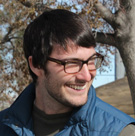Greg Hahl
 Graduation Year: 2010
Graduation Year: 2010
Major: with an Certificate, and a Minor in .
Why did you choose Sociology?
I entered Wheaton officially “undecided,” and slightly intimidated by all those people who think they know exactly what they want to do with their lives. My only known passion was people, an admittedly broad category that could include a number of disciplines. After taking some sociology classes, however, I realized that sociology provided helpful tools by which I could understand people and communities. Sociology is necessary for anybody wanting to love our neighbors in a tangible, educated way.
Which courses made the biggest impression on you?
course entitled “Class and Inequality” was perhaps the most formative class for me. I was awakened to the larger systemic and historical structures of oppression that have kept some people in power and kept others far away from it. Taking his course, as well as finishing my semester downtown through , was effectively like getting repeatedly smashed upside the head with the world’s problems and inequalities. I had been ruined for the ordinary upwardly-mobile American Dream and decided I had to devote my life to God’s Kingdom and the service of others—initially out of guilt, then out of duty, and now hopefully motivated by love.
Which professors impacted you?
I was impacted by , Priest, and . Of them all, Dr. Kim pushed me the farthest and the hardest, for which I am grateful.
How/why did you choose to follow your path beyond graduation?
While at Wheaton in Chicago I interned for Heartland Human Care Services >> as an adult ESL and computer teacher to Latino and Eastern European immigrants. I had always loved multiculturalism and was deciding between working with immigrants or working with youth, another lifelong passion. Through my Heartland connection I got a job as a Refugee Youth Case Manager—a combination of my two passions! For two years I managed after school programming, a mentoring program, and youth case management for young refugees from around the world. The job was fun, dynamic, and challenging—equal parts office work (reporting, case notes, etc.) and out of office work that included 1 on 1’s with “at risk” youth, running after school programs, and home visits.
What are you doing now?
I left my job at Heartland last summer after hearing God’s call to Denver. I spent last July raising support and am now an urban missionary and community developer through Providence Center for Urban Leadership Development. Now I live in a diverse, economically poor neighborhood and am involved in a start-up anti poverty campaign as a case manager, closing the achievement gap through literacy tutoring, and mentoring/developing of fatherless youth in my neighborhood.
What advice do you have to offer a potential major?
Sociology offers a more educated and compassionate way to think about the world, our society, or neighbors. You will be given the tools to do the research that informs policy on local, national, or international levels. That said, sociology is not a major for people who want a concrete skill, such as accounting or a foreign language. But looking back, I would not trade it for any other discipline.